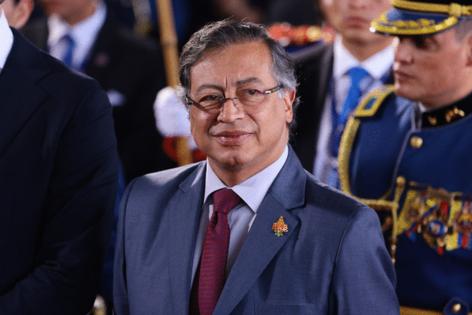Congress would slash aid to Colombia over drug use allegations in Petro's government
Published in News & Features
A powerful congressional panel led by Florida Republican Rep. Mario Díaz-Balart is moving to sharply cut non-military U.S. aid to Colombia, citing a combination of rising instability, weakening rule of law and growing concerns about drug use within the highest levels of President Gustavo Petro’s government.
In a report released this week alongside the 2026 National Security, Department of State and Related Programs Appropriations Bill, the House Appropriations Committee criticized Petro’s government for what it called “detrimental policies, erratic behavior and malign relationships.”
The report also flagged concerns about increased drug use in Colombia, including among top government officials, and what it described as a deteriorating security situation.
As a result, the committee is proposing a 50% reduction in non-military assistance to Colombia compared to 2025 levels. The move, driven by Díaz-Balart — chair of the subcommittee that oversees foreign aid — signals a shift in what has long been a bipartisan consensus supporting Colombia as a close strategic ally in the U.S.-led fight against narcotrafficking.
The bill still requires approval by the full House and reconciliation with Senate legislation before becoming law. Still, the proposed cuts point to a significant cooling in relations between Washington and Bogotá, adding pressure on Petro’s government amid growing domestic and international scrutiny.
The committee report referenced the June 7 assassination attempt against opposition senator and 2026 presidential candidate Miguel Uribe Turbay as emblematic of Colombia’s mounting political instability. It also cited the resurgence of armed groups in regions previously reclaimed under Plan Colombia, the multi-billion-dollar U.S. security initiative launched in the early 2000s.
“The security environment is deteriorating, and political volatility is on the rise,” the report states, warning of escalating violence in several parts of the country.
Among the more unusual elements of the report is its focus on domestic drug consumption in Colombia—traditionally seen as a drug-producing nation rather than a consumer one. The congressional committee directs the secretary of state to consult with Congress within 90 days on launching drug demand-reduction programs in Colombia.
The report’s reference to alleged substance abuse among government officials comes amid renewed political turmoil in Bogotá.
Earlier this year, a leaked audio recording surfaced in which former Foreign Minister Álvaro Leyva — once a key Petro ally — appeared to call for Petro’s removal from office, reportedly citing health concerns. According to the Madrid newspaper El País, Leyva traveled to Washington in April and attempted to meet with Republican leaders, including Díaz-Balart and Secretary of State Marco Rubio. It remains unclear whether any of those meetings actually took place or whether U.S. officials seriously entertained Leyva’s claims.
The committee also raised alarms over judicial proceedings against former President Álvaro Uribe Vélez, a staunch U.S. ally. The report cites alleged due process violations, unauthorized surveillance and judicial politicization as cause for concern, framing the case as part of a broader trend of democratic erosion worldwide.
“These challenges reflect a troubling pattern of threats to due process and judicial independence,” the report reads.
Despite the proposed cuts to development and civilian law enforcement aid, military support remains largely unchanged. The bill allocates $38.5 million in Foreign Military Financing and $67.3 million for National Security Investment Programs. The International Narcotics Control and Law Enforcement account would receive $103 million, underscoring the continued importance of counternarcotics efforts in the bilateral relationship.
If adopted, the bill would mark a rare and dramatic recalibration of U.S.-Colombia ties, long rooted in security cooperation but now increasingly strained under Petro’s leftist government.
_____
©2025 Miami Herald. Visit miamiherald.com. Distributed by Tribune Content Agency, LLC.







Comments